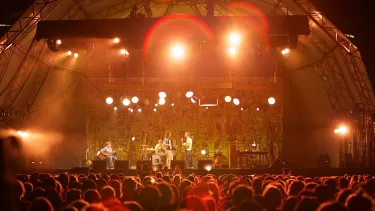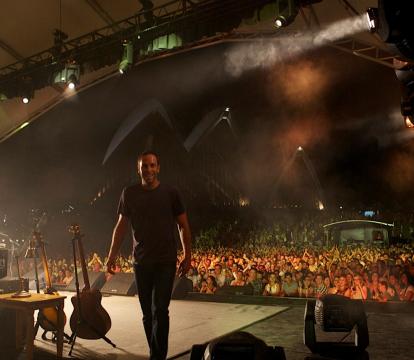Jack Johnson is making concerts recyclable
Tour manager Max Tischler on how he makes a world tour eco-friendly
From recycling food waste to building an artificial coral reef in the harbour, preserving the natural environment flows through everything the Opera House does. Guitarist and singer Jack Johnson has been at the forefront of sustainability in music, an industry where the environmental impact of country-hopping flights, freight carrying tonnes of amplifiers, drum kits and keyboards, and discarded food and drink packing, often goes unchecked. We talked to Max Tischler, who has led Jack’s tour greening as well as environmental initiatives at Splendour in the Grass festival, about what they’re doing to cut down their impact on the road.
Jack’s Greening Tour was ahead of environmentally-conscious concerts before it became a trend. How do you think touring has changed?
There’s no doubt touring can have a substantial ‘footprint’—there’s lots of people and equipment moving around, often over large distances. Jack has been conscious of that from the start, which is why we continue to tour the way we do. I think we’ve demonstrated that there are very easy ways to modify tours, even slightly, that can significantly reduce these environmental footprints and in turn create positive impacts.
Over the years the response from fans really has set the foundation for both us and other artists, as it creates a level of interest and expectation for venues to discard the norm. Many of the venues we’ve played in 2017 have been really receptive to implementing and championing sustainable initiatives, and fans now arrive at shows knowing what to expect and excited to participate. This change will continue with more and more artists making similar requests of the venues, and continued patronage of fans with the expectation that shows are built on a notion of sustainability.
Are people’s attitudes towards sustainability and recycling changing?
Yes, absolutely. With the constant barrage of global issues surrounding overwhelmingly large topics—like climate—I think people are becoming more aware of their own personal impact, and how this can be modified to make a difference. It’s empowering for individuals to become conscious of how they consume, what they buy, and how they dispose of their waste (as an example). This can shift the classic top-down paradigm and is evident in many towns and cities we visit where progressive waste management is becoming more and more common. We see this at our shows where fans actively engage with our on-site programs, but also with venues who now adopt many of our initiatives as part of their standard business model (not just as one-offs when we roll into town!).

We also need leaders who can hear, relate and react to the the evident groundswell that is demanding change...
Where do you think the world is at now with sustainability? What has changed so far, and what needs to change?
That’s a really tough question. Currently, I think there’s a better a realisation that our collective futures can not be divorced from the natural world. Having said that, there appears to be a distinct lack of urgency and leadership by our elected decision makers. The systemic issue is that the environment has become politicised—which has lead to a perilous decline in understanding exactly what we need to protect, when and why. As powerful as individuals’ actions can be, we also need leaders who can hear, relate and react to the the evident groundswell that is demanding change—they need to inspire and support the new technologies required to sustain a burgeoning global population but also safeguard the fundamentals of functioning healthy ecosystems as foundations for creating policy.
We’ve recently been working to improve the harbour that the Opera House sits in and its biodiversity. How do you think your sustainability efforts directly impact the areas and venues where you tour?
We like to think that our tour has the potential to make positive impacts wherever we tour. Obviously, the band and crew implement a lot of sustainable initiatives on the road—but the real impact is the engagement with fans at shows. This is why the Village Green is such an important part of our tour. The Village Green is a dedicated space at each of our shows where we invite a number of non-profit groups, active in those communities, to set up displays and activations. Generally the groups are focused on marine conservation issues or sustainable food production—both of which Jack is very passionate about. It creates a space where fans engage with these groups, which often leads to active involvement and participation after the show and beyond. Those relationships and what might follow can have profound impacts.
Your team offers simple ways for punters to participate in sustainability (allowing people to offset carbon emissions on buying tickets). How can concert-goers be more conscious of the environment when they’re actually at your shows on the Forecourt?
We will have many sustainable activations fans can participate on the Forecourt. We encourage fans to:
1. Bring their own reusable water bottles to the show so they can visit our WeRefill water stations for free filtered or sparkling water, and support our plastic-free initiatives;
2. Spend a few minutes visiting the Village Green and connect with some of our amazing non-profit partners- including free ‘rescued’ bananas from OzHarvest;
3. Make a pledge in front of our photo wall;
4. Thoughtfully dispose of their recycling and food scrap at our waste stations (we aim to minimise or eliminate waste bound for landfill; and
5. Use alternative transport to get to the show (trains, bike, carpool).
All At Once, which is Jack’s social action network made up of all the non-profit groups he supports, has the by-line “individual action, multiplied by millions, creates global change”. I think that pretty much sums it up.
Jack Johnson plays the outdoor Forecourt on Thursday 30 November, Friday 1 December and Saturday 2 December.
